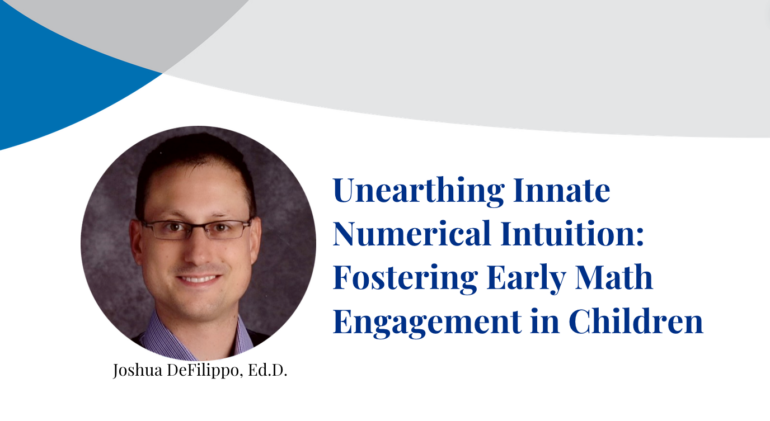For many, the term “math” often triggers stress and anxiety. As Steven G. Feifer noted in his book, “The Neuropsychology of Mathematics,” math anxiety arises as a byproduct of poor math skills, and, in turn, this fear can also be the primary cause of mathematical difficulties. As we learn more about when students begin to develop avoidance behaviors toward math, it falls on parents and educators to encourage and instill a more positive outlook on math in our children.
Perhaps we can start by adapting our own mindset or understanding of what children are already capable of achieving. Many believe that all mathematical knowledge is acquired through experience or direct teaching, serving as a “cognitive product.” However, there is emerging evidence that children are born with an innate and natural mathematical instinct that enables them to quickly acquire their first sense of numbers, a preverbal system of perceiving quantity, with little in the way of explicit instruction.
In 2021, Jacob Beck and Sam Clarke compiled research on this subject in their Behavioral and Brain Sciences article, “The number sense represents (rational) numbers,” postulating that a person’s number sense helps them perceive quantities as numbers, much like seeing the actual color red as opposed to the word “red.” Similar to identifying shape and color, children have the ability to represent numbers before they learn to count in language and think of numbers precisely.
In 2009, Véronique Izard and her colleagues examined newborns in France younger than 5 days old who listened to auditory sequences of either four or 12 sounds. They were then presented with either four or 12 visual objects. They found that 15 out of 16 of the study’s participants looked longer at the visual displays when they numerically matched the sounds as opposed to when they did not match. Even though this may be interpreted as a mere coincidence, as newborns do have poor eyesight, it continues to suggest that infants are sensitive to numbers.
This does not mean infants can solve complex equations, but this innate perception can serve as building blocks to expand upon. On their own, children are still limited compared to adults who have studied even the most basic arithmetic, but we shouldn’t underestimate how this initial contextual understanding of numbers may prove beneficial for active development. Therefore, we should take advantage of this opportunity.
How? Start simply and gradually connect this internal perceptual understanding of numbers with language systems by pointing out math in the child’s environment through casual conversations as early as possible. The more you incorporate math concepts into a meaningful context, the more you can begin integrating new abstract perceptions and applying them to real-world events in the child’s life.
For example, play sorting games, compare and contrast items, or point out real situations and use the terms “add,” “subtract,” and “divide.” If your child enjoys watching and playing sports, explain the concept of averages, or if they enjoy helping you in the kitchen, show them measurements or hypothesize how much you would make if you doubled the recipe.
Pretty soon, new numerical abilities can arise, and they will be able to expand their own ideas into forms of problem-solving and select their own math strategies.
Joshua DeFilippo, Ed.D., ABSNP, serves as a professor for the Ed.S. and Psy.D. School Psychology Programs at The Chicago School. Dr. DeFilippo is an alumnus and received his doctoral degree in School Psychology from The Chicago School with an emphasis in school neuropsychology. For over a decade, Dr. DeFilippo served in public, charter, and public-school settings as a practicing school psychologist. While working in schools, Dr. DeFilippo was a site supervisor for beginning, intermediate, and advanced practicum students. Dr. DeFilippo is also a diplomat for the American Board of School Neuropsychology. He started as an adjunct professor in 2016 teaching statistics, psychometrics, educational and behavioral assessments, school-based intervention, and biological and cognitive bases of behavior before joining the core faulty in 2023. His current research and consultation interests are in trauma-informed approaches to students in crisis, utilizing data analytics in schools, and integrating neuropsychological assessment within the Multi-Tiered System of Supports (MTSS).

